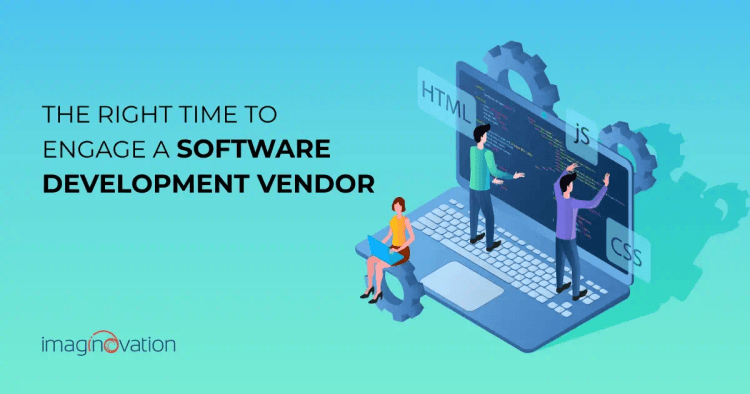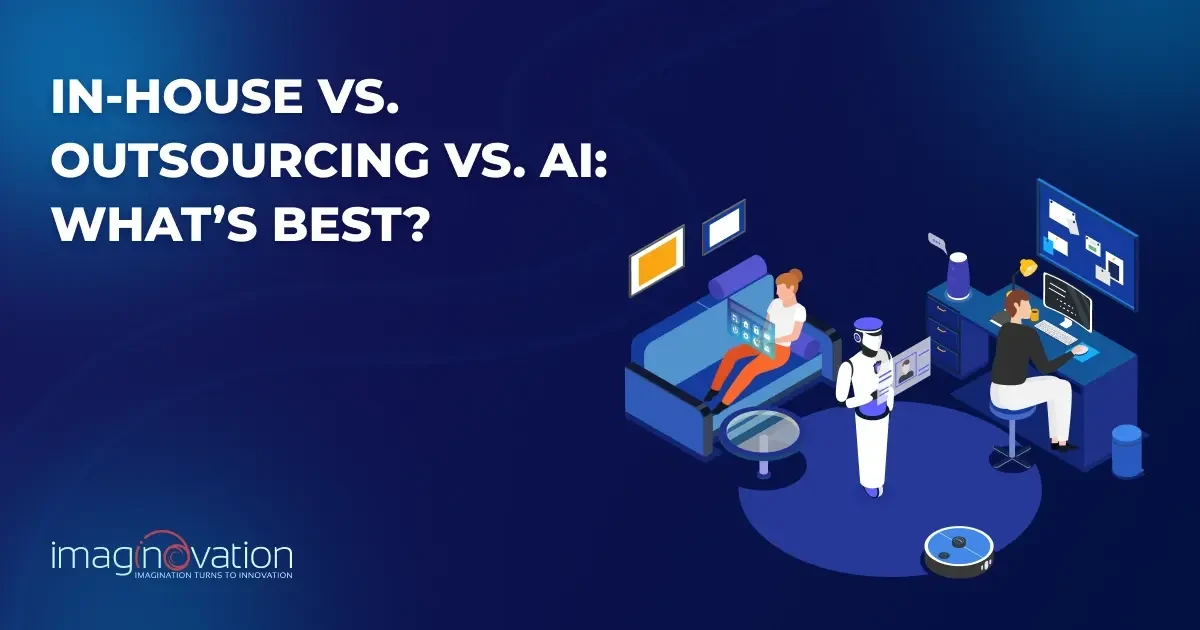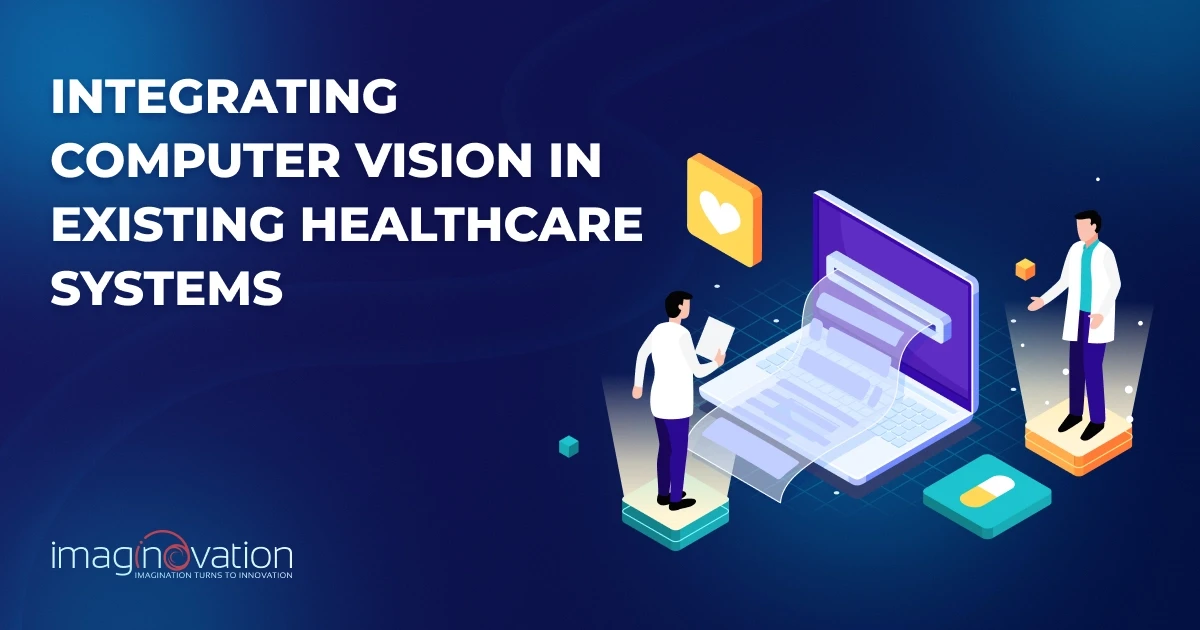Deciding when to engage a software development vendor is a critical step in any project and can be a game-changer.
While it's important to "ask for their portfolio" and "talk to their clients" before making a decision, these are not the only steps to take.
Knowing when to collaborate with a vendor is also critical to optimizing your project's potential.
When you encounter signs such as complex development requirements, the necessity for specific skills, or a shortage of internal resources, it becomes evident that engaging a vendor is necessary for your project.
In this guide, we explore the different types of software development agencies, present their pros and cons, and offer insight into when it is the right time to engage a software development vendor. We also discuss the benefits and challenges of this collaboration.
Here we go!
Understanding Software Development Vendors and Their Role.
Software development vendors are organizations/agencies that play essential roles in the development process. They offer their services to meet the diverse needs of business. Here are the key roles they play:
First, they provide analysis and consultation services. Custom software development vendors work closely with you to understand your business objectives. Based on your business’s unique challenges and requirements, they offer valuable advice and expertise to help you make informed decisions about technology choices and project scope.
Next, these vendors specialize in custom software development. They create software solutions tailored specifically to your needs. In short, they are your go-to solution for developing (coding, designing, testing, and deploying) software customized to address specific challenges and improve organizational efficiency.
These vendors also offer crucial services such as quality assurance and software testing. They have dedicated teams that perform comprehensive tests to identify and fixbugs and issues, helping ensure that the software you receive meets the desired quality standards.
After deployment, these vendors offer maintenance and support services. These include updates, bug fixes, and enhancements to keep software secure and optimized.
Additionally, vendors may offer training to help you effectively use the developed software. They also provide documentation such as user manuals and technical guides for future reference.
Types of Software Development Vendors
Vendors in software development fall into different categories: development agencies, freelance developers, and consulting firms.
Development agencies specialize in end-to-end software development by following structured processes and industry best practices.
Freelance developers are independent professionals hired on a per-project basis. They excel in specific programming languages or technologies. Freelancers offer flexibility but may lack a dedicated team.
Consulting firms provide strategic guidance for software development. They advise on technology selection and digital transformation, assist with defining requirements, assess feasibility, and even manage projects.
You can also categorize them as outsourcing vendors, specialized Development firms, and
Based on their specific offerings and focus areas, software development vendors collaborate with organizations during software development lifecycle phases. They provide services like requirements gathering, design, development, testing, deployment, and ongoing maintenance. They work closely to understand project objectives and deliver tailored solutions.
Identifying When to Engage a Software Development Vendor
When it comes to software development, timing is everything. Let's explore the signs indicating the right time to bring in a software development vendor.

1. When You Lack In-house Expertise
Are you facing a project that requires specialized skills that your current team lacks? If so, outsourcing your software development to a vendor could be the solution you're looking for.
Outsourcing companies typically have expertise in specific areas, bringing skills and experience that might be difficult to find locally. For instance, if your project demands a particular skill set that no one on your team possesses, outsourcing to a software development vendor can provide immediate access to the necessary expertise.
The benefits of outsourcing continue beyond these. By outsourcing, you can tap into specialized skill sets, knowledge, and resources without the hassle of hiring and training new employees.
Outsourcing your software development to a vendor can be a practical solution if you need a more extensive skill set for a specific project.
2. When Your Project is Time Sensitive
Have you ever found yourself in a situation where your internal developers are struggling to meet deadlines for feature releases, bug fixes, or MVP launches? If so, you're not alone; finding a software development vendor may be the solution to getting back on track.
When project timelines are slipping, the instinctive response is often to allocate more internal resources. However, this can be challenging and costly, as it may require hiring new team members. Finding qualified candidates who fit the bill can be daunting.
This is where custom software development vendors come to the rescue, offering several advantages in such situations.
3. When Your Project Has Scalability Needs
A software development vendor can be a valuable resource if you need to scale your development efforts rapidly.
For example, suppose you are launching a new product or expanding into new markets. In that case, a vendor can quickly allocate additional resources to your project or even assemble dedicated development teams specifically tailored to meet your unique needs. This scalability can help ensure that your project stays on track and can handle the increased workload that comes with growth.
So, when you need to scale quickly, a software development vendor can provide the scalability you require.
4. When Your Project is Complex
Complex projects often require a diverse skill set and deep technical knowledge, and outsourcing provides access to a global talent network, which can be essential for tackling intricate development challenges.
Additionally, outsourcing can bring an external perspective and innovative solutions to complex projects, leveraging the experience and insights of seasoned professionals.
5. When You Seek Cost Efficiency
Are you seeking a cost-effective way to meet your software development needs without compromising quality? If yes, this is the biggest sign you need to engage a software development vendor.
Besides, hiring and maintaining an in-house development team can be expensive. Engaging a software development vendor allows you to access their resources and expertise without the ongoing overhead costs associated with full-time employees.
By leveraging expert teams and accessing new technologies without expensive investments, you can save costs and stay within budget constraints.
6. When You Need to Adopt New Tech
To stay competitive, businesses often need to adopt new technologies or platforms. However, implementing new technologies can be complex and time-consuming if your internal team lacks the necessary expertise.
A software development vendor can bring in specialized knowledge and experience with the latest technologies, helping you navigate the adoption process more efficiently.
Benefits of Working with a Software Development Vendor
Partnering with a custom software development vendor can offer the benefits mentioned below to businesses looking to develop software solutions.
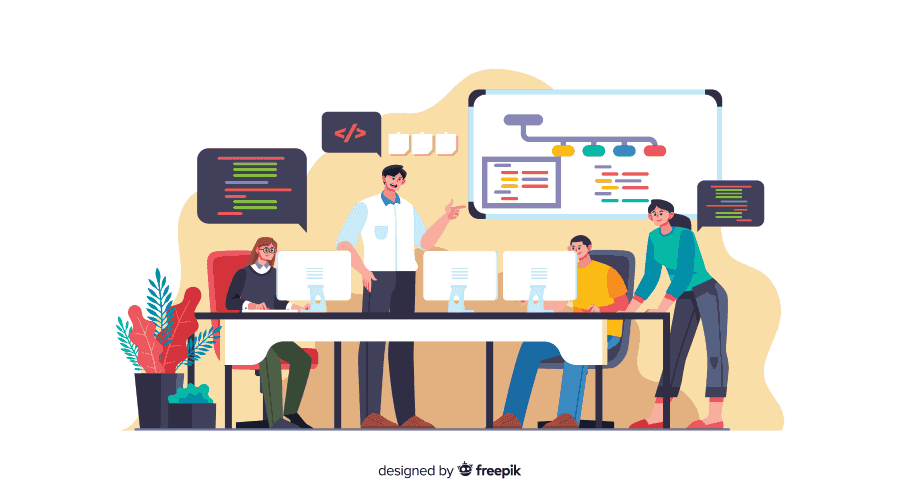
1. Faster Development
Software development companies usually have the right resources, tools, expertise, and infrastructure to start your project quickly. This results in accelerated software development and quicker time to market - a crucial advantage in the business world.
2. Access to expertise
Software development vendors provide access to highly skilled and experienced teams. These professionals have specialized knowledge and expertise related to technology and best practices that your internal team might lack. This ensures that your project is in capable hands.
3. Focus on Core Competencies
Outsourcing software development allows you to focus on your business’s core competencies. By delegating development tasks to a vendor, you can concentrate on strategic business activities and let the experts handle technical aspects. This way, you free up your internal resources for other important things.
4. Cost Efficiency
Outsourcing software development to external vendors can eliminate substantial team hiring, training, and salaries costs. It is also often more cost-effective, as you only pay for the specific services needed, thus optimizing resource allocation and budget.
5. Customized Solutions
Outsourcing custom software development provides tailored solutions to meet your business's needs and requirements. Whether you require a complex enterprise solution or a simple mobile app, an outsourced team can deliver the optimal solution. Unlike pre-made software solutions with limited capabilities, custom development builds applications aligned with your unique circumstances.
6. Access to Latest Technologies
Software development vendors stay up-to-date with the latest technologies and industry trends. You can leverage their knowledge and access cutting-edge technologies for your software development projects by partnering with them.
7. Mitigated Risks
Software development vendors often have robust risk management strategies in place. These strategies are based on industry best practices and quality assurance methodologies. These vendors can identify and mitigate potential risks, ensuring smooth project execution and reducing the chances of costly errors or delays.
Also Read: A Complete Guide to Lean Software Development
Challenges in Engaging a Software Development Vendor
Engaging a software development vendor can present some challenges, including -
1. Reliability and Trustworthiness
Challenge - Choosing an unreliable software development vendor can result in unexpected issues and unsatisfactory outcomes. For instance, an agency that fails to deliver on time can disrupt the planned marketing strategies of your IT project, causing significant setbacks and frustration. They may engage in unethical practices such as using pirated or low-quality software tools.
Solution - To mitigate this challenge, do thorough background research and choose a reputable vendor with a strong track record. Request references and conduct due diligence to assess the vendor's reliability and quality standards.
2. Communication Barriers
Challenge - Remote teams like software development vendors face a higher risk of miscommunication. Discussions that would typically happen in person now occur through written channels like email or chat, increasing the likelihood of misinterpretation. Difficulties in reaching the project lead can prolong urgent issues, potentially affecting project timelines. In fact, as much as 57% of project failures are attributed to poor communication.
Solution - You can overcome communication barriers through regular and open communication channels. Focus on establishing clear and concise communication protocols, utilizing project management tools, and leveraging video conferencing to bridge communication gaps.
3. Managing Expectations
Challenge - Aligning expectations between the business and the vendor is vital. These expectations are essential for a successful project collaboration. These include having clear objectives for stakeholder involvement, defined response timing in communication, intellectual property rights, etc.
Solution - Define clear and detailed project requirements to manage expectations. Have regular progress meetings and milestone reviews to promote mutual understanding. Maintaining ongoing communication about project goals, timelines, and deliverables is important. This will help you avoid any misalignment of expectations.
4. Intellectual Property Protection
Challenge - Protecting intellectual property (IP) can be a concern since you expose your valuable data and intellectual property to a third party you’ve not met before. When you engage a software development vendor, overlooking the safety of your intellectual property can lead to major issues. It's easy to assume that you automatically own the software developed for you, but without it being clearly outlined in the contract, you could end up in a legal battle to assert your ownership rights. Moreover, it's crucial that the vendor takes proactive measures to safeguard your business ideas and data from any potential plagiarism.
Solution - Robust contractual agreements, including non-disclosure agreements (NDAs) and intellectual property clauses, can help address this challenge. Additionally, it is crucial to select vendors with a strong reputation for respecting and protecting IP rights.
5. Quality Assurance and Control
Challenge — Ensuring that the product delivered to you is of high quality is important but difficult to assess because it requires more effort on your part since your in-house team has not developed this software.
Solution - Set clear expectations for work quality with your vendor right from the word go. Before committing to work with the vendor, check their standard project oversight protocols and pre-launch testing procedures to confirm that they have robust quality control measures.
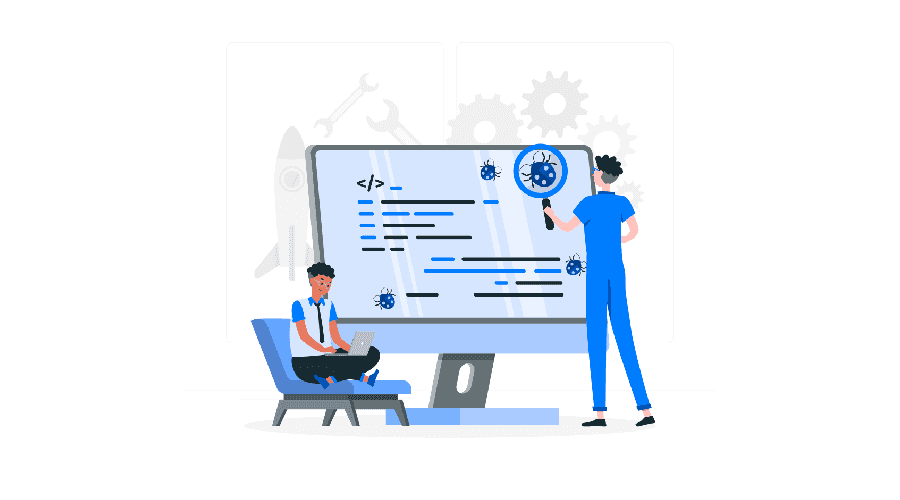
Also Read: Why Every Business Needs a Software Quality Audit
Preparing Your Business to Work with a Software Development Vendor
Are you considering working with a software development vendor for your upcoming project? Preparing for this collaboration is key to ensuring its success.
By defining your project requirements, researching potential vendors, establishing communication channels, and setting quality standards, you can lay a solid foundation for a productive partnership. Here’s what you must do:
Step 1 - Determine Your Project Requirements
Clearly outline your project goals, deliverables, functions, budget, and timeline. Determine what specific software development services you require. Identify any specific technologies, platforms, or integrations required. This step sets the foundation for estimating the resources and effort you’d need.
Step 2 - Research Potential Development Vendors
Conduct thorough research to identify reputable software development vendors. Consider factors such as their expertise, technologies they specialize in, industry experience, portfolio, client reviews, and pricing. Check the kind of projects they’ve handled so far. Determine if they match your project needs.
Step 3 - Evaluate Vendors Who Look Promising
Schedule meetings or interviews with shortlisted vendors. Assess their understanding of your project. Check their responsiveness, communication style, project management processes, work culture, and values. Ensure there is a good fit between your business and the vendor.
Step 4 - Check Credentials and References
Verify the vendor's credentials, certifications, and qualifications. Request references from their previous clients and talk to them to gauge their satisfaction with the vendor's work.
Step 5 - Review Contracts and Agreements
Carefully review the vendor’s contracts and agreements, including terms on project scope, deliverables, timelines, payment terms, and intellectual property rights. Ensure there is clarity on dispute resolution mechanisms and confidentiality clauses.
Step 6 - Establish Communication Channels
Determine the primary communication channels and frequency of updates with the vendor. Identify the points of contact on both sides to streamline communication.
Step 7 - Set Expectations and Milestones
Clearly define expectations for project milestones, progress updates, and deliverables. Establish timelines, quality standards, and key performance indicators (KPIs) to track progress. Decide who will be responsible for project management, decision-making, and resolving issues during development.
Step 8 - Clarify Testing and Quality Assurance Processes
Discuss the vendor’s testing and quality assurance processes to ensure that thorough testing will be conducted before launch. Agree on testing protocols, bug-fixing procedures, and acceptance criteria. Clarify how bugs and issues will be addressed during the development and testing phases.
Step 9 - Secure Your Data and Intellectual Property.
Discuss data security measures and intellectual property protection with the vendor. Ensure that data privacy regulations are followed and mechanisms are in place to safeguard confidential information.
Step 10 - Establish a Plan to Collaborate and Provide Feedback
Establish a plan for collaboration, feedback, and revisions throughout the project lifecycle. Define how feedback will be provided, reviewed, and implemented to ensure alignment on project goals.
Accelerate Your Software Development with Imaginovation
Outsourcing software development offers numerous advantages, including cost savings, improved efficiency, and access to a specialized talent pool.
However, realizing these benefits hinges on collaborating with reputable software development company like us. At Imaginovation, we are committed to creating exceptional experiences and achieving business objectives through our customized software solutions.
Reach out to us today, and our skilled team will work with you to better understand your needs and provide tailor-made solutions aligned with your business goals.
Ready to build an app, but not sure where to start?
We've got you covered. Click the button below to get started.

